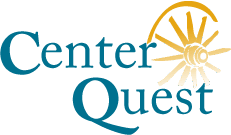Life forces us to make decisions all the time. Should we go this way or that way? Take this job or that one? Choose this path or that one?
How do we know how to choose?
Today I’d like to invite you to consider the way your personhood can help you in your discernment process. If you are familiar with the Myers-Briggs personality type indicator, you know that it carries four categories of indication for each person’s make-up:
- Introvert or Extrovert
- Sensing or Intuitive
- Thinking or Feeling
- Perceiving or Judging
There are loads of resources available to explain each type indicator and to help you determine which indicators are your dominant preference. But today, I want to consider how these personality type indicators can be helpful to our processes of discernment.
“An Introvert and an Extrovert Walked Into a Bar . . .”
Let’s start with the difference between an introvert and an extrovert.
These categories speak to how each of us gains or loses energy. An introvert becomes weary from too much external stimulation and becomes energized and filled up through “down times” of solitude — times that allow them to think, reflect, and rest in the quiet. An extrovert finds that solitary, quiet activity a bit draining and becomes much more energized when around other people.
If you’re in a process of discernment, then, it can be very helpful to know yourself in terms of energy pulls. Depending on whether you’re an introvert or extrovert, which path will drain or pour in energy?
“A Thinker and a Feeler Had to Make a Decision . . .”
Now let’s consider the difference between a thinker and a feeler.
For someone who is a thinker, charting out a pro-and-con list for a particular decision-point they need to make can prove immensely clarifying and helpful. A thinker will also be helped along in their decision-making by conducting research or appealing to those with knowledge or experience related to the decision-point they’re considering.
Someone who is a feeler, on the other hand, might find themselves better served by noticing the emotive affect a particular decision casts upon them when they hold it inside themselves. They may also be helped by paying attention to the physical response in their body when weighing one decision over another.
Which Myers-Briggs type are you, and how might that reality about yourself shed light on the decision you are seeking to make? Has your personality preference type served you to discern a decision you needed to make in the past?

Thanks Christianne for a simple yet engaging compass for discernment. My natural grooves of being a feeling-extroverted-introvert give credence to listen to my feelings through journaling, silence and solitude. All so important especially in times of consolation. My growing edge is to remember who I am in times of desolation (which is so hard to do). I need to allow my feelings to be vehicles rather than letting my feelings name me. I also have a tendency to run to others too quickly during those times of desolation. But my truth is that I need isolation first, and I need to journal the feelings and then sit with them in prayer. So in other words, though I am a feeler, it is through isolation that my feelings serve me well by naming and then surrendering them. All this ironically helps me to become a better thinker (rationalize) and it is only then that I can be centered enough to have others join me in beneficial ways.
I love the way you’ve put all this, Val, and am so glad for the ways you’ve learned what works best for the way you’re made.
Christianne, as I know you are already aware, to discover more about God is, by default, to uncover more about ourselves in the process. St. Bernard of Clairvaux declared self-love for God’s sake to be the highest form of love to which we can aspire. At first I found this off-putting. But, the more I sat with it, recognizing how much our lives are largely ego projections based on our own broken self-images, the more it made sense. So often, we end up worshiping something other than the biblical God. When God looks just like me, God probably IS me. Therefore, to understand who we are is to come to love who we are and not feel any need to be other than that person. Then, God can be exactly who God actually is without any projections. The deeper I know God, the deeper I come to see myself, both good and bad, and am OK with that.
Signed, INFP/Enneagram 4/OCD-ADD-LOL Celtic-contemplative-on-the-journey
LOL! Love your signoff signature there, Rob. 🙂
“To understand who we are is to come to love who we are and not feel any need to be other than that person. Then, God can be exactly who God actually is without any projections.” YES! This is real love, for it is rooted in freedom: ours, as well as the other person’s.